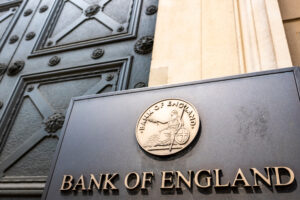
The outlook for the UK and global economy has “deteriorated materially” due to inflationary pressures largely stoked by Russia’s invasion of Ukraine, putting extra strain on British household and business finances, the Bank of England (BoE) has warned.
The worsening economic outlook has caused volatility in global markets in recent months with more turbulence likely, the Bank said in its quarterly health check on the UK’s financial system.
UK banks will need to set aside more cash to absorb shocks in the markets from next year but are in good shape to provide lending support to households and businesses, it added.
“The economic outlook for the UK and globally has deteriorated materially,” the BoE said in its latest Financial Stability Report. “Prices of essential goods such as food and energy have risen sharply in the UK and globally, and the outlook for growth has worsened. This is largely a result of Russia’s illegal invasion of Ukraine.
“These higher prices, weaker growth and tighter financing conditions will make it harder for households and businesses to repay or refinance debt. Given this, we expect households and businesses to become more stretched over coming months. They will also be more vulnerable to further shocks.”
BoE officials have ordered UK banks to set aside 2% of their capital – about £22bn – as part of the countercyclical capital buffer from this time next year.
The buffer – introduced in the wake of the financial crisis to ensure banks have a rainy day fund – was slashed to zero during the pandemic, releasing billions of pounds to help businesses and households. Officials stressed that they are ready to release the cash again, especially if the economy performs worse than currently expected.
However, the Bank said that most households and businesses went into the current financial crisis with relatively low debt levels and would be in a similar position in December.
While the Russian invasion of Ukraine has increased commodity prices and sent inflation soaring to its highest level in 40 years, most households and businesses are expected to cope with the extra financial burden without defaulting on mortgages and loans.
Inflation is expected to rise to 11% later this year and the central bank’s base interest rate could increase to as high as 3% by the end of 2023, according to some economists.
Rising costs are expected to depress the living standards of many families and put many in financial distress.
However, it said about 80% of UK mortgages are on fixed rate deals, and despite 40% needing to be refinanced over the next 18 months, mortgage payers were in a good position to afford higher interest bills.
Nevertheless, the central bank, which regulates banks and insurance companies, said a deterioration in the global economic outlook, as inflation hit consumer spending power and company profits, raised a number of risks for the finance sector across the world.
“The outlook is subject to considerable uncertainty and there are a number of downside risks that could adversely affect UK financial stability,” the BoE said.
Britain’s unemployment rate will rise over the coming year and company profits will come under pressure “particularly in energy-intensive sectors and those I sectors most exposed to the fall in real household incomes”, the report said.
Commodity markets had become more volatile, creating risks that financial markets could seize up.
Buyers of wheat, metals and oil needed to borrow funds worth several times the sums required last year to buy the same level of goods, putting a strain on lenders.
However, there was little sign of a “dash for cash” by investors in a repeat of the panic in March 2020, when at the beginning of the pandemic money market funds that act as lenders of last resort found themselves lacking the firepower needed to provide their usual backstop role.
The report said increases in interest rates by many of the world’s central banks would also put companies and highly indebted governments under strain.
US and Chinese companies that have borrowed heavily and EU governments with high debt levels were a potential risk, the report added.
Read more:
Bank of England warns that economic outlook has ‘deteriorated materially’





